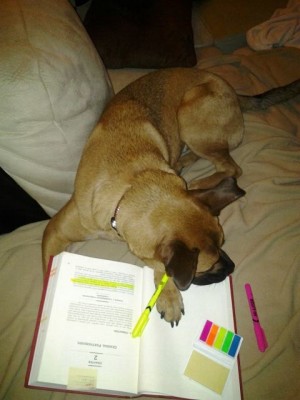
A mind is a terrible thing to waste
Please read the following study guide. I am sure you will find it useful as a quick reference as well as a reminder to keep organized, take notes efficiently, and read effectively. There is a
positive relationship between organizational skills and academic achievement. Planning is the anticipation of what you need to accomplish and the setting of a course of action for accomplishing
it. I have put together this guide to help you plan for success because I believe that you shall succeed, not just in school, not just in your field of study, but after you graduate and continue with
your life. Success for any of us requires that we take personal responsibility for it!
Organize your work and your time.
Allot enough time for completing your assignments.
Commit yourself to meaningful goals.
Develop an effective plan for achieving these goals.
Do NOT be discouraged.
Value your time.
My motto: Work hard, Play hard.
Nurture your talents, be creative, and strive for success.
Aim for good grades, not just in school but also in life.
Plan each day:
- Hours spent in school- ____
- Hours spent studying- ____
- Hours left for leisure- ____
Calculate Reading Time
Count number of pages you must read:_______
It takes about 4 minutes to read a page:X 4
Calculate how many minutes to read all pages:_______
Please remember that the subject of a reading assignment shall affect your reading speed and comprehension.
Establish Goals
Goal setting is determining what you want and what you can accomplish. I believe that if you think you can, then you shall!
On a day planner or calendar, please list for yourself to-do items that relate to assignments, tests, quizzes, or any other tasks that you need to get done within a specific time frame.
Please do this frequently throughout the year and be flexible to change.
Study Environment
Please make sure that your study area has:
- Good lighting
- Comfortable chair
- Comfortable temperature.
Study while you are alert.
Study without background noise.
Work on one assignment at a time.
Schedule reading and note taking in 50 minute periods.
Schedule 30 minute sessions for memorizing facts, figures, and dates.
Use the library and allow ample time for research.
Develop Good Reading Skills
Successful people complete their reading assignments on time. Consequently their learning is reinforced when much of the same material is then covered in a lecture or discussion.
Please follow these simple steps BEFORE reading an assignment.
Examine the Table of Contents
Read the Introduction
Survey each chapter
Read for ideas and details. Usually there is one main idea per paragraph, and this is the first sentence of the paragraph.
Use the learning aids contained within the chapter:
- Chapter headings and subheadings
- Boldface and italicized words
Use aids found at the end of the chapter:
- Chapter summary
- Glossary
- Review questions
- Suggested readings
- Take notes in outline form.
Listen Effectively
Pay special attention during the first and last 5 minutes of the lecture. (preview and summary)
Concentrate on the speaker.
Listen with your mind not your emotions.
Be prepared by reading the assignments.
Relate ideas to previous lectures and personal experiences.
Seek answers to information you do not understand.
Avoid conduct distracting to others.
Participate constructively in discussions.
Taking Notes
Label notes with date and chapter of text or appropriate headings.
Make notes of new material.
When the lecturer writes on the board it is usually important.
Use your own system of shorthand as much as possible.
Do not focus on what you already know.
Summarize major points at the end of each lecture.
Use underlining, asterisks, and highlighters for important ideas.
Take facts down correctly.
Compress your notes using your own words.
Improve your Memory
Do not study when hungry, disorganized, or emotionally upset.
Have correct facts and ideas before trying to remember them.
Get the proper amount of sleep.
Build memory by scheduling shorter, periodic sessions.
Review your notes 5-10 minutes after a lecture, then again later that day.
Stimulate all senses.
Form or join a study group.
Taking tests
Preparing involves reading and reviewing.
On average it takes about 2 minutes to review a page.
For essay tests:
Read all questions first.
Underline important facts and key words in each question.
Always take 1 or 2 minutes to think and organize your thoughts before writing.
For multiple choice tests:
Answer the questions you are sure of first.
Do not spend a lot of time on any one question.
Check the time every 10 minutes.
Leave 5 minutes at the end to go over your answers.
Adobe Acrobat document [36.2 KB]
Adobe Acrobat document [22.0 KB]
Adobe Acrobat document [12.2 KB]
Adobe Acrobat document [412.6 KB]
Read the two documents below then answer in group discussion format the following questions:
1. What was the most important insight you gained from the reading?
2. What surprised you most in the reading?
3. What did you already know?
4. Did you identify with any of Kolb's learning style? Which one or ones?
5. Which one of Perry's stages of intellectual development did you identify with?
6. One of Fink's categories of significant learning is learning how to learn. Have you been taught how to learn before? Where? What did you learn about learning?
7. What will you do differently during a lecture, if anything, given what you read?
8. How will you prepare differently for exams, given what you read?
9. Can you think of other good learning practices that the reading didn't mention?
Adobe Acrobat document [2.7 MB]
Adobe Acrobat document [1.4 MB]
Contact Me
Sarah Nilsson, J.D., Ph.D., MAS
602 561 8665
You can also fill out my
Get Social with Me
Legal Disclaimer
The information on this website is for EDUCATIONAL purposes only and DOES NOT constitute legal advice.
While the author of this website is an attorney, she is not YOUR attorney, nor are you her client, until you enter into a written agreement with Nilsson Law, PLLC to provide legal services.
In no event shall Sarah Nilsson be liable for any special, indirect, or consequential damages relating to this material, for any use of this website, or for any other hyperlinked website.
Steward of
I endorse the following products
KENNON (sun shields)




















